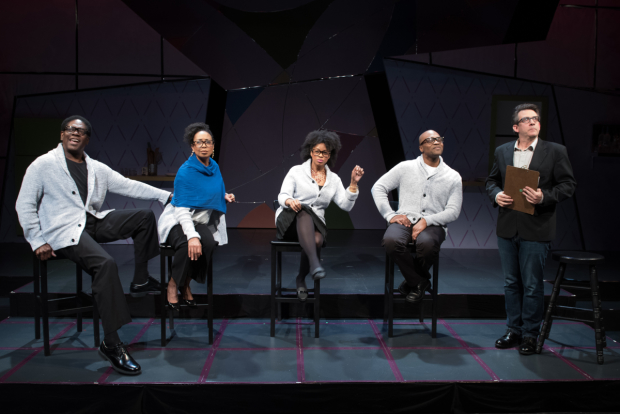
(© Glenn Perry)
Robert O'Hara seems to have written several different plays and rolled them all into one for Bootycandy, now running at SpeakEasy Stage at Boston Center for the Arts. There are disclaimers for the show, as the company warns, "strong language, adult content, and nudity," but does not mention the blatant clichés that O'Hara enlists, nor the disconnect between the satire and the dark message beneath the gags.
The play is composed of a series of sketches, riffing on the Saturday Night Live format, that deal with the sexual adventures of members of the black community. The structure also takes off from George C. Wolfe's The Colored Museum, which O'Hara admits was an influence.
Bootycandy opens on a scene between a mother and son, Sutter, who is asking the meaning of some sexually suggestive words that he has heard but does not understand. His mother gets angry and fudges her responses. Next, we meet a stern but effusive minister who warns about the perils of gossip-mongering as members of his church come perilously close to learning his secret. We revisit Sutter as a teenager who is trying to get the attention of his mother and stepfather by disclosing that a white man followed him home. However, mom and dad are not listening.
Each of these disparate skits is presented in the broadest of styles that are no less demeaning than 19th-century minstrel shows. While the audience is urged to laugh at the gags and silly portrayals, there is a sense of unease in their reaction.
By the second act, the viewer starts to connect the dots. Various characters are now related in terms of the neighborhood, and Sutter is a grown man. He cruises the gay bars with a friend, picks up a drunken white man, and takes advantage of the man's inebriated state. The short scenes refer to people and places we saw in Act 1, including the lesbian couple undergoing a ceremony of breaking the marriage vows. The preacher substitutes the word "hate" for "love" in the language. At first the conceit is funny, but soon becomes tedious from too much repetition.
Under the direction of Summer L. Williams, the juxtapositions in the first act make little sense, except to deliver some hilarious moments. A campy Johnny Lee Davenport harangues his flock from behind a pulpit, and John Kuntz creates a fast-moving solo dance out of a string of stereotyped, gay gestures. The only white man in the cast, Kuntz transforms into the clueless moderator of the mock conference that ends Act 1 to ask condescending questions of four black playwrights lumped together because of their race.
When the action turns bleak and realistic in the second act, the viewer is asked to care about Sutter's life journey and excuse his motives. The snap-quick transformations make Sutter hard to compute, never mind rendering him likable. However, Maurice Emmanuel Parent gives a fine performance in the role, first pushing for laughs, then playing it cool to hide the rage that burns inside him. Jackie Davis and Tiffany Nichole Greene complete the excellent ensemble, especially winning in a three-way phone conversation conducted in ghetto patois.
The bare-looking set designed by Jenna McFarland Lord skillfully hides the built-in bars and cabinets in an economic use of the space, enhanced by pieces of furniture to help establish the various locales.
By the end, Sutter returns to the comfort of his Granny (Davenport again), relegated to a wheelchair in her nursing home, before yet another turn-around when the playwrights return as characters who strayed in from a Pirandello landscape. At less than two hours (with one intermission), Bootycandy seems too long to encompass so many plots and ideas that are cut and snipped to create a pastiche that is beyond comprehension.










